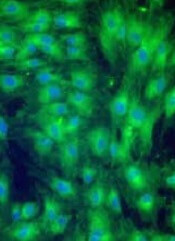
SAN DIEGO—Infusions of expanded mesenchymal stem cells (MSCs) can treat severe, steroid-resistant, acute graft-vs-host disease (aGVHD) in pediatric patients, according to a study presented at the 2015 BMT Tandem Meetings.
The MSC product, known as remestemcel-L, induced responses in all grades of aGVHD and all organ systems.
Response at day 28 was associated with improved survival at day 100, and clinically significant toxicities were minimal, according to investigators.
“The enrolled patients represent a very challenging population with severe graft-vs-host disease that was non-responsive to treatments, including steroids and, for many of these children, multiple immunosuppressive agents, so we believe these results are very promising,” said Joanne Kurtzberg, MD, of Duke University Medical Center in Durham, North Carolina.
Dr Kurtzberg and her colleagues reported the results in a poster presentation (abstract 492*). Three investigators involved in this research are employed by Mesoblast, Inc., the company developing remestemcel-L.
The study included 160 patients who had a median age of 10 years (range, 0.3 to 17.5 years). Eighty-four percent of patients had received an unrelated donor transplant, and 46% received a mismatched transplant.
At baseline, 19% of patients had grade B aGVHD, 28% had grade C, and 53% had grade D. Eighty-nine percent of patients had gastrointestinal involvement, 50% had skin involvement, and 29% had liver involvement. Forty-one percent of patients had 2 organs involved, and 15% had 3.
The median duration of aGVHD before study enrollment was 28 days (range, 1 to 237), and patients had failed a median of 3 immunosuppressive agents.
Treatment and outcomes
Patients received 8 bi-weekly, intravenous infusions of 2 × 106 MSCs/kg for 4 weeks. They could receive additional weekly infusions if deemed eligible at day 28.
The patients received a median of 11 infusions (range, 1-20) and were exposed to the treatment for a median of 43.5 days.
Fifty-three percent of patients had at least 1 serious adverse event. Eight patients (5%) had serious events that investigators thought might be treatment-related. These included neutropenia, infusion-related reaction, pulmonary hemorrhage, respiratory distress, tachycardia, respiratory failure, and hypertension.
Three events (6%) that were considered possibly treatment-related (pulmonary hemorrhage, respiratory distress, and respiratory failure) ultimately resulted in death. Fifty-four patients (34%) died in all.
At day 28, the overall response rate (ORR) was 64%. The ORR was 74% for grade B aGVHD, 66% for grade C, and 59% for grade D. The ORR was 62% for gastrointestinal, 77% for skin, and 53% for liver aGVHD.
Response correlated with a significant improvement in survival at day 100. Eighty-one percent of patients who responded at day 28 were still alive at day 100, compared to 21% of non-responders (P<0.0001).
The investigators said this study provides support for remestemcel-L to treat aGVHD in children. A single-arm, phase 3 trial of pediatric patients with aGVHD is underway.

*Information in the abstract differs from that presented at the meeting.

